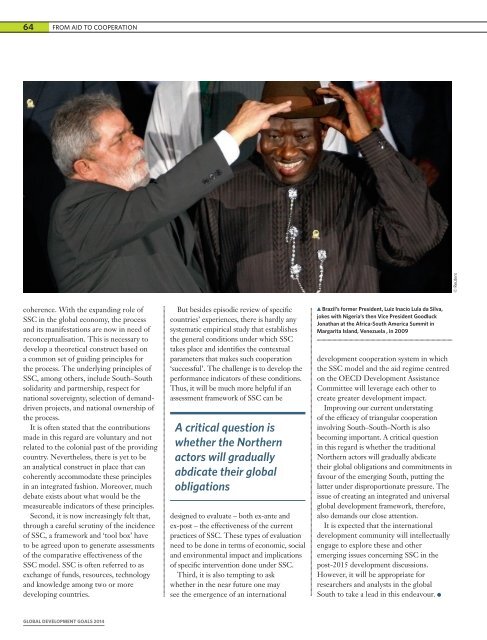64 FROM AID TO COOPERATION© Reuterscoherence. With the expanding role ofSSC in the global economy, the processand its manifestations are now in need ofreconceptualisation. This is necessary todevelop a theoretical construct based ona common set of guiding principles forthe process. The underlying principles ofSSC, among others, include South–Southsolidarity and partnership, respect fornational sovereignty, selection of demanddrivenprojects, and national ownership ofthe process.It is often stated that the contributionsmade in this regard are voluntary and notrelated to the colonial past of the providingcountry. Nevertheless, there is yet to bean analytical construct in place that cancoherently accommodate these principlesin an integrated fashion. Moreover, muchdebate exists about what would be themeasureable indicators of these principles.Second, it is now increasingly felt that,through a careful scrutiny of the incidenceof SSC, a framework and ‘tool box’ haveto be agreed upon to generate assessmentsof the comparative effectiveness of theSSC model. SSC is often referred to asexchange of funds, resources, technologyand knowledge among two or moredeveloping countries.But besides episodic review of specificcountries’ experiences, there is hardly anysystematic empirical study that establishesthe general conditions under which SSCtakes place and identifies the contextualparameters that makes such cooperation‘successful’. The challenge is to develop theperformance indicators of these conditions.Thus, it will be much more helpful if anassessment framework of SSC can beA critical question iswhether the Northernactors will graduallyabdicate their globalobligationsdesigned to evaluate – both ex-ante andex-post – the effectiveness of the currentpractices of SSC. These types of evaluationneed to be done in terms of economic, socialand environmental impact and implicationsof specific intervention done under SSC.Third, it is also tempting to askwhether in the near future one maysee the emergence of an internationalBrazil’s former President, Luiz Inacio Lula da Silva,jokes with Nigeria’s then Vice President GoodluckJonathan at the Africa-South America Summit inMargarita Island, Venezuela , in 2009development cooperation system in whichthe SSC model and the aid regime centredon the OECD Development AssistanceCommittee will leverage each other tocreate greater development impact.Improving our current understatingof the efficacy of triangular cooperationinvolving South–South–North is alsobecoming important. A critical questionin this regard is whether the traditionalNorthern actors will gradually abdicatetheir global obligations and commitments infavour of the emerging South, putting thelatter under disproportionate pressure. Theissue of creating an integrated and universalglobal development framework, therefore,also demands our close attention.It is expected that the internationaldevelopment community will intellectuallyengage to explore these and otheremerging issues concerning SSC in thepost-2015 development discussions.However, it will be appropriate forresearchers and analysts in the globalSouth to take a lead in this endeavour.GLOBAL DEVELOPMENT GOALS 2014
SPONSORED FEATUREAid with no catchesBy Jonathan Duffy,ADRA International PresidentHelping those who are displaced, living in poverty and suffering isnot just about providing aid but engaging with the private sectorto help communities break the cycle of dependency and thriveindependently.The Adventist Development and Relief Agency (ADRA) has a long andsuccessful track record of engaging communities around the world and iscurrently working in 130 countries to help relieve suffering and empowerindividuals.ADRA focuses on delivering aid in five major development centres: foodsecurity, economic development, primary health, disaster preparedness andresponse, and basic education. Last year we helped provide aid to over 12.5million beneficiaries around the globe and over the course of our 30-yearhistory we have helped in excess of 200 million people.As a major partner of the United Nations, ADRA believes strongly inworking with local authorities and leaders to engender trust and kick-startcollaborative change. However, there is another piece to the aid puzzle that isfundamental to providing real and lasting change in communities.A recent project, lasting five years, which took us to Mozambique, sawthe introduction of a revolutionary new way of providing aid which dependson engaging the private sector.The project focused on delivering a sustainable food programme andeconomic development in the area through building business resilience andmoving local farmers from survival farming to farming as a business.The project centred on the creation of a farmers’ association that isnow run as a credible, legal organisation and represents farmers in the localregion. The establishment of the association has multiple benefits.Firstly, it focuses on identifying which crops are in demand from theprivate sector and encourages farmers to respond to demand for specificcrops, which they can then sell.It has become the touch-point for the private sector, whether it issupermarket distributors or crop exporters, who can be assured theassociation is a legitimate organisation and has sufficient members to fulfilorders and contract obligations, something which a single farmer working ontheir own would not be able to do.And the association can also be a conduit through which farmers canaccess micro-finance, something they may have previously been denied dueto a lack of documentation or collateral.This way of working provides a value chain approach to delivering aid,which is crucial if farmers are to build sustainable business and communitiesare to become more resilient.There is a collaborative element to working in this way; with farmersdiscussing and implementing best practice and orientating production tomeet demand rather than working in silos purely to feed themselves, theyare creating a business and becoming part of the value chain.Setting up these projects is not simple but it can be done. Most often thebiggest hurdle is convincing local communities to accept that ADRA is thereto help and that the aid does not come with any ‘catches’. With projectsspanning five-year timeframes, ADRA has the ability to integrate in thecommunities, share struggles and find solutions that really work, as well asoversee a handover that ensures the intended beneficiaries really do benefit.When ADRA’s project finishes we aim to leave communities with abetter understanding of, and place in, the market and knowledge about howto conduct a micro-market service and orientate production to meet marketdemands.Furthermore the farmers are supported not only by their own tradeorganisation but also community leaders and local governments andauthorities with whom ADRA works in tandem to deliver the best outcomes.The private sector undoubtedly is a winner, with access to anothersource for much-needed crops, but the biggest winners are those who makeup the local communities who are given security of jobs, food and, mostimportantly, resilience.


